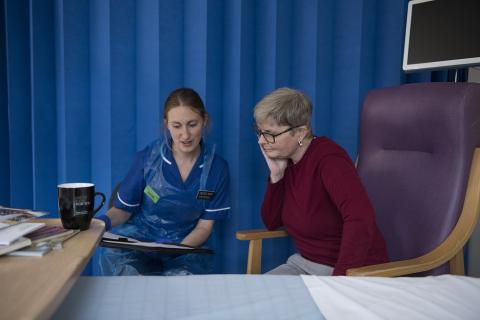Our ambition at Anthony Nolan is that every patient receives the care and support they need before, during and after a stem cell transplant, for as long as necessary and no matter where they live. Through over 45 years of supporting patients and their families, we know without the whole community of transplant staff, there is no cure.
Recognising the value of the work carried out every day by the medical specialists and Allied Healthcare Professionals who form the transplant workforce is vital to realising this ambition. Across the UK, the NHS is rethinking how best to support the people that work within it to deliver the care of the future. NHS England published its Interim NHS People Plan in June 2019. Both Scotland and Wales are also developing their future workforce visions.
When talking with patients who have had a stem cell transplant, we know not everyone has access to the support they need. Here are some of those vital roles that can make a difference:
Providing specialist support for patients
Having the support of a Clinical Nurse Specialist (CNS), who has expert knowledge of the needs of patients, can improve a patient’s experience during treatment and after to help deal with any side-effects.
Research by Anthony Nolan showed that only 68% of stem cell transplant patients have access to a CNS who is easy to contact throughout their long-term care. To help address this challenge, Anthony Nolan funds a network of dedicated specialist post-transplant nurses based in hospitals across the UK.
NHS England’s Long-Term Plan includes a commitment for all cancer patients to have access to the right expertise and support by 2021 and the Scottish Government is working with Macmillan to provide every cancer patient with a support worker. Anthony Nolan recently published a post-transplant care pathway which highlights the importance of a CNS and key workers, roles which need funding so nurses have more time for each patient.
Addressing emotional and psychological needs
A stem cell transplant is a lifechanging event and its impact on patients’ everyday lives can be challenging. The community required to help patients on their treatment and care journey includes Allied Health Professionals like physiotherapists and must also think about their emotional wellbeing.
In 2017, our research found that not all patients who needed it were getting specialist psychological support, often leaving them feeling like they have “fallen off a cliff”. We are currently funding three Transplant Clinical Psychologist posts to support patients and with the benefit of demonstrating the valuable role these posts can contribute to the core NHS workforce.
Ahead of the General Election, we supported the development of the One Cancer Voice manifesto which is calling on all parties to ‘prioritise the emotional and psychological needs of people diagnosed with cancer’.
Helping to discover the best match
The transplant workforce is not just about those who work directly with transplant patients. Researchers, technicians and diagnostic specialists help to deliver vital insights into improving transplant outcomes.
Clinical Scientists who work in histocompatibility and immunogenetics (H&I) at Anthony Nolan and within NHS hospitals can help to assess the closeness of the match between patients and donors and advise on donor selection.
Researchers at Anthony Nolan are also investigating patient and donor participants as part of a long-running study. By examining the genetic relationship between these pairs and monitoring patients post-transplant, new insights are being discovered into the factors behind improving patient outcomes.
What more needs to happen to improve patient outcomes?
Having the right staff in place can make a huge difference to patient experience and outcomes. With 40,000 new blood cancer diagnoses in the UK every year, the NHS workforce needs to be ready.
For blood cancer and blood disorder patients, this will mean more haematologists, more Allied Health Professionals and a focus on research and training in advanced cell therapies, which will become a bigger part of the treatment landscape.
At Anthony Nolan, we’ll never stop pushing for the whole workforce community to be valued; making the case for every patient to have access to the tailored support that can help their recovery.
If you or someone close to you is going through a stem cell transplant and would like more support, our Patient Services team are here to help. Find out more at anthonynolan.org/Patients
